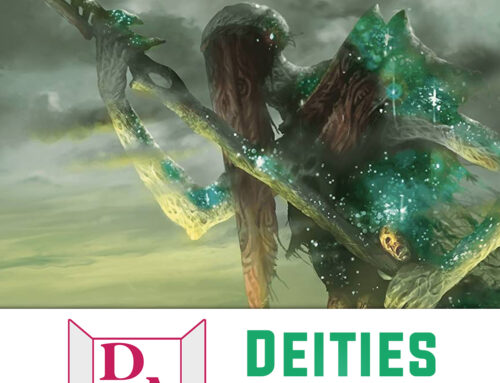Deus Primaevo
Most creation myths begin with the arrival of one or more gods that started everything, that turned empty void into space and time. Who were the first gods? Who drew open the curtains and turned on the lights of known time and existence? In the Forgotten Realms it was Selune and Shar, the sisters that represent the duality of light and dark, that shaped the universe. In Eberron it was the three Progenitor Dragons: Siberys, Kyber, and Eberron that made the universe and created the world of Eberron. These gods establish the foundation of the universe that the rest of the pantheon is built upon.
Figuring out what the origin of your world is will build the pantheon. You will need players in that story, and they will begin to fill roles and domains for mortals to worship, admire, and fear.
The Universe Personified
In fantasy we assign divine personifications to natural forces: Life, Death, Seasons, Oceans, Suns, and Magic. The personalities of each of these personifications changes how these natural forces act in the world and how mortals perceive them.
Death is possibly the best example of this. How you personify death and their underworld can radically change a culture’s view on death. In the Forgotten Realms there was Myrkul, a neutral evil deity who was portrayed as a terrifying entity that made mortals perpetually fearful of death, and the dark realm Myrkul ruled. He was later replaced by Kelemvor, a more lenient and kinder deity who wanted to remove the corruption of those that came before him, his afterlife was more peaceful, and the disposition towards death shifted with him.
How many gods you have and what forces are in their portfolio affects what is important to the cultures that develop under them. Do you have a god of fire, or a god of the sea? What are they like, and what virtues do they ask of their followers? Answering these questions will help you develop your pantheon and how they interact with their worshippers.
Eternal Conflicts
Pantheons very rarely work together in perfect harmony, the desires and ethics of one god will inevitably conflict with those of another god. In Greyhawk, Hextor and Heironeous are the bitterest of enemies, despite both being gods of war.
Hextor is an evil deity that wishes to see the strong dominate the weak through merciless tyranny. While Heironeous is noble and honorable, wishing for the strong to enter conflict to protect the weak. Danger is to be faced head on with calm and resolve. These gods work towards each other’s destruction and they’re worshippers and the bitterest of enemies. This immediately creates a conflict that can play out in the world and can help shape the stories of a world.
Worship and Prayer
What do the gods of your pantheon demand of mortals? What prayers do mortals ask of the gods? These are the common interactions of the mortal and the divine. What tribute and holidays are given to the gods, and what boons and blessings are given in turn. This can give a lot of personality and depth to a faith. Is a portion of a harvest or livestock sacrificed to the god of winter to stay his hand during the cold months? Do fishermen toss back a species of fish because it is sacred to a god of the sea? Which faiths have structured hierarchy and churches? Are these faiths part of the government or is the worship of a god instead very personal and intimate. Is there a god that demands blood?
Little Gods
Not every powerful entity in a setting is a true god. There are plenty of other beings that can be powerful enough to bestow gifts, whether they are powerful archfiends, fey lords, or terrifying powers from beyond the known planes. These can often make for compelling patrons for warlocks, or the center figures for cults and sects that influence your world. What is great about these beings is that they more often than not have more concrete agendas than gods, who are looking at the much larger picture or their domains and portfolios.
Gods are often too big to speak with in person, they are lofty and ethereal, but a powerful fiend of hells can have more worldly wants and can allow for more intimate interactions and roleplay. A fey lord can be capricious and flawed in a way the gods usually aren’t.
They also scale well with the leveling system of Dungeons and Dragons. At low levels these little gods appear to have limitless power, towering far above the players, but by the time they’re in the higher levels (about 15 to 20) they are more akin to peers, wielding power that is nearly equivalent.
Conclusion
Your pantheon is the context by which your players understand the mythology of your world. They establish the tone and personality of your world. A god’s morals, virtues, and churches will help establish the cultures of your world and craft the normality or life there. Know which of your gods hold the most sway, and who is looking to usurp them. And never forget the little powers that seek to manipulate the hearts of mortals and gain their loyalty in exchange for boons.


